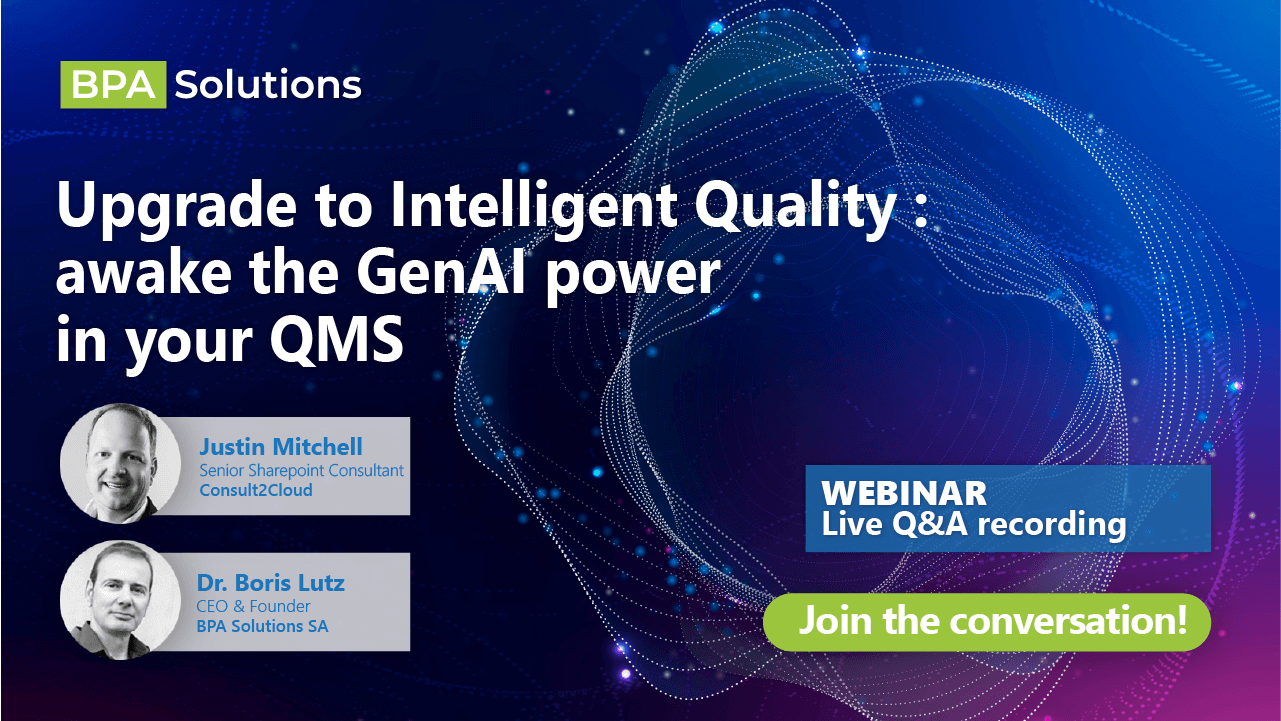
Upgrade to Intelligent Quality: insights from our webinar

This month we had our third Webinar uncovering how Q-Pilot, our newly developed and AI powered virtual assistant, helps you achieve efficient and cost effective compliance revolutionizing QMS practices.
The live Q&A session was a dynamic exchange, allowing us to tailor our insights to the audience specific queries. Now, we’re excited to unveil the valuable answers that emerged, shedding light on common concerns.
Watch the video of the live Q&A session of our Webinar or read the transcript here below!
What data security measures are in place to protect sensitive information when using BPA Pilot in your QMS? How can we ensure sensitive data is appropriately secured? How do we make sure certain documents are not overshared by GenAI?
The whole QMS and the GenAI services are in the client cloud, in their secure Microsoft 365. I also mentioned the MFA, Multi factor authentication. So, this is really secured in the client cloud. Now what is interesting is that these Power Automate Workflows are triggered by any condition that the client would like to set. For example, if a document is confidential or has a high privacy level, these documents should not be indexed to appear in the GenAI response. Or we can also activate the GenAI on modules that are hidden for certain users and limit its use to the concerned persons. We can even have different workspaces on SharePoint online: some of them would have the GenAI service enabled and other not, therefore only users with the right permissions would be able to access the available content.
Additionally, the client can turn off the access to internet. Here all use cases that we have demonstrated today were limited to the perimeter of the QMS system. So no data goes outside the cloud. Hence, it is fully secure. Now, if you wish to enable external access you might have pre-configured questions to ask for new regulations introduced for AI Management System, for example: this would then go to the web and pull information from the community. We have a lot of granularity over what we allow the Q-pilot to see. For example, we may allow answers from published documents but not from documents that have not yet been published. But that can be based as well on a variety of things: confidentiality flag, the type of document, etc.. There is really a lot of granularity, ensuring the highest level of security.
Can Q-pilot read all types of documents in the search for answers (e.i. doc, pdf, xcl, etc.) ?
Office documents are obviously supported. The way it works is that all this content is pushed to Azure so that Open AI service and Search AI can access the content. Any type of document that can be full text indexed by Office365, which is a very large set of documents, can be included in the AI Search. It fits most of our clients’ needs: pdfs, word, power point, excel…
Can Q-pilot be limited to only certain users?
Yes, absolutely. We can set specific permissions for specific modules of our eQMS, granting access to specific users only to certain parts of the platform . We can also set different workspaces with different permissions. So, there is a lot of granularity here as well to set these permissions at the user and module level.
Is there an AI quick start package for existing BPA customers? If yes, which plan is needed and what additional costs will Q-pilot represent?
This is good news because our clients have the software already installed so less services will be required to run the AI part. We have just introduced a BPA Premium plan that includes these AI services. So by just switching to the premium plan, AI services will be included. So there is a little higher subscription rate to get this AI package inside your existing QMS system. From a service perspective, we will need some hours that we may take from the client’s available service hours package, or some extra hours if needed to install and set up the required AI services. Also, depending on the use cases you are interested in, you may need to acquire the needed power automate workflow so that you can start right away with the preconfigured workflows. So there are just limited costs for having access to very useful use cases that will save you many hours of manual work and therefore increasing the skills and performance of the company.
When standards such as ISO 9001 revises, how does the BPA software using AI accommodate those changes?
Changes do not happen that often (usually every 7 years). With Q-Pilot, we can have an automated workflow to periodically check for regulatory changes and update them in the BPA platform.
I saw that the questions and answers are in one cell, this makes it difficult to report. How is it possible to report on training results e.g 20 people answered question 5 correctly 10 people didn’t / average score on this document training equals …. ?
At the end we want everyone to answer correctly to all questions, and elevate company skills while reducing manual work and associated cost. This is the purpose of this AI-driven automated training process. It’s not about rating people performance, but rather to have everyone to read and understand important procedures. The most useful reporting here is to have a training matrix to quickly highlight collaborators who need help on certain procedures for a related job profile (we use Power BI for this). Another approach would be to use quiz in MS Forms and collect points (and report on them). But this would require manual adjustments because quiz cannot be processed in automated workflows.
We are using M365 and BPA. We are starting our discovery work with implementing AI/Copilot in our Organization. What is the difference between Copilot and Q-pilot?
Q-Pilot is our virtual assistant for your eQMS, powered by OpenAI (ChatGPT). It’s a QMS productivity tool. This is different from MS Copilot, which is an office productivity tool. Q-Pilot is independent from Copilot. Generative AI used in Q-Pilot refers to machine-learning models that are trained to create new data, rather than just making predictions based on existing data.



